Murray Income Trust (LON:MUT) has significantly outperformed its FTSE All-Share Index benchmark and the majority of peers over the past year, in large part due to its focus on high-quality companies with strong balance sheets, which have held up better than others in recent bouts of market volatility. Manager Charles Luke takes a long-term approach, giving time for company fundamentals to win through and reducing trading costs. The trust has an increased focus on mid-cap and smaller companies (now c 30% of the portfolio) and also has the ability to invest up to 20% (currently c 11%) overseas. The manager highlights MUT’s attractive income characteristics, with a 4.0% yield, above-average dividend growth and dividend security, and a 46-year record of increasing its annual payouts.
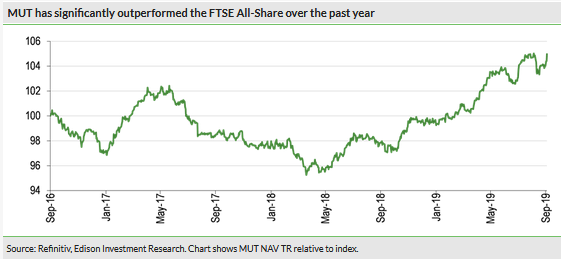
The market opportunity
The UK market remains unloved by global investors, with Brexit uncertainty providing an additional headwind on top of wider fears over a slowing global economy and the impact of trade wars. However, this has led to below-average valuations, potentially giving rise to attractive opportunities in quality companies, particularly in the less well researched smaller- and mid-cap space.
Why consider investing in Murray Income Trust?
Strong performance record, both long-term and more recently.
Enhancements to investment team and process as a result of Aberdeen/Standard Life merger.
Strong focus on environmental, social and governance (ESG) factors, which research shows is important in generating performance.
46-year record of annual dividend growth, with move to quarterly payments.
Share price/discount performance
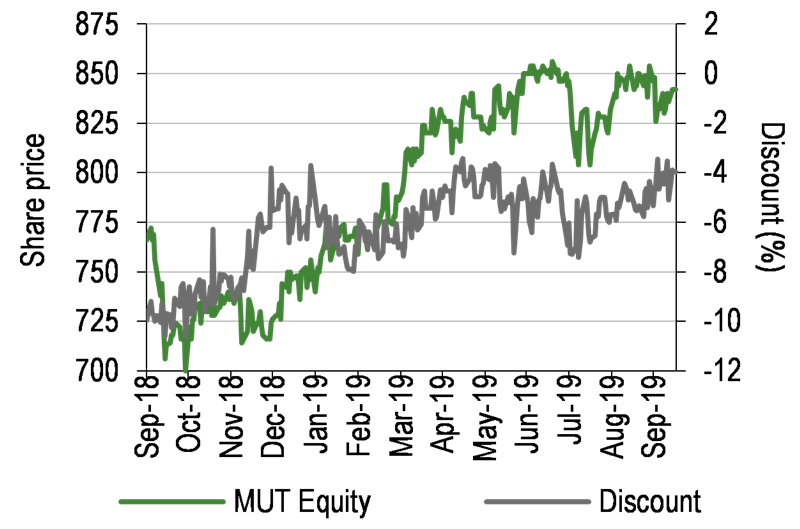
Three-year performance vs index
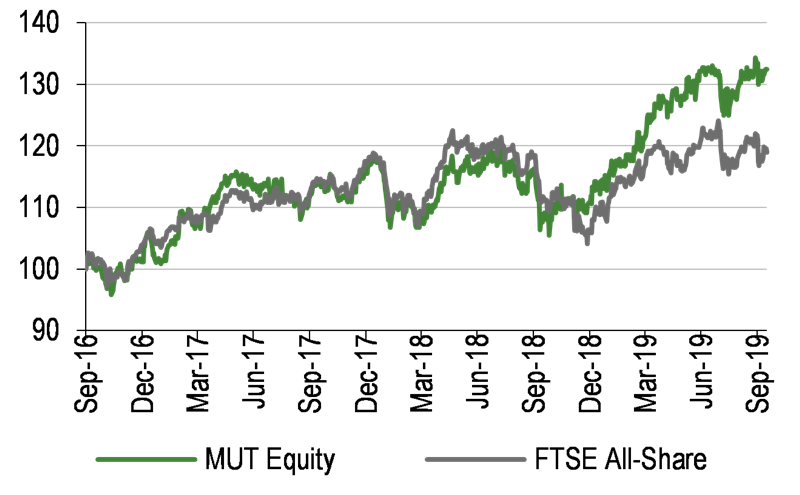
Narrower discount and c 4% dividend yield
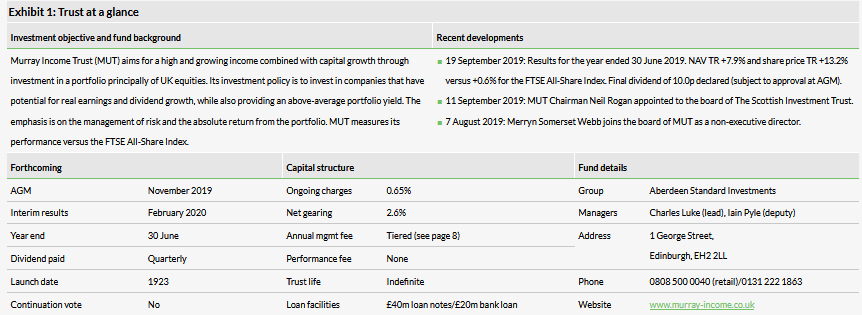
At 16 October 2019, MUT’s shares traded at a 4.0% discount to cum-income NAV. This was an increase from the narrowest point in three years (3.4%, in May 2019) but is well below the average discounts over one, three and five years, which range from 6.2% to 7.7%. The discount has narrowed on the back of strong NAV performance; while the higher share price has also caused MUT’s dividend yield to dip to 4.0%, the portfolio continues to enjoy higher forecast dividend growth than the index.
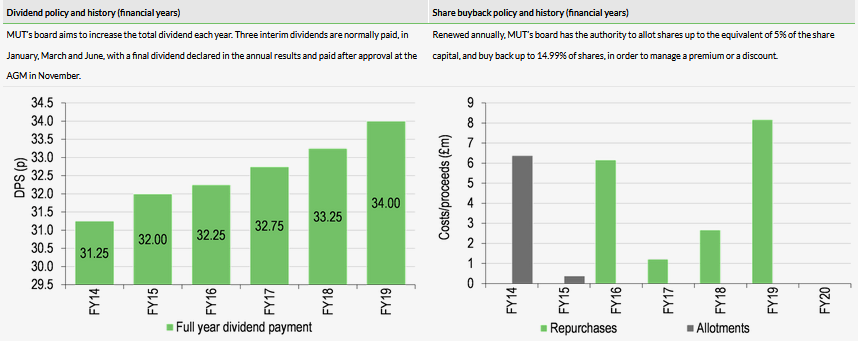
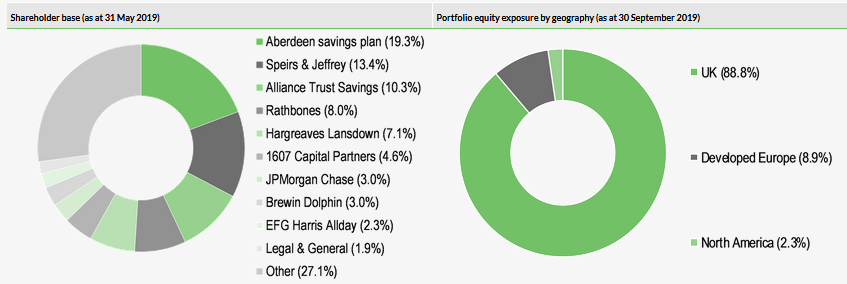
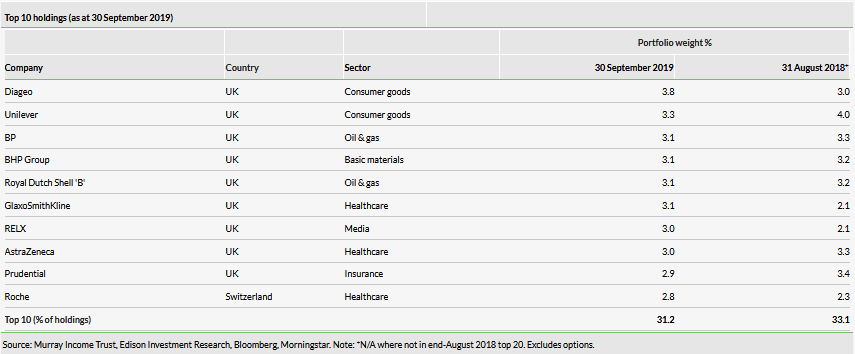
Market outlook: Valuations looking attractive in the UK
Markets have bounced back strongly following the widespread sell-off in Q418, with support from monetary policy on both sides of the Atlantic helping to allay investors’ fears over the slowing global economy and the impact of the US-China trade war. However, Brexit uncertainty continues to weigh heavily on sentiment towards the UK market, with sterling moving up and down quite sharply in response to shifting opinions on the likelihood of achieving a deal before the latest deadline of 31 October. Against this backdrop, UK equities – while advancing in value on a total return basis – have significantly lagged global equities over the past five years (Exhibit 2, left-hand chart), exacerbated by the weakness of sterling since mid-2016 on the back of the referendum result.
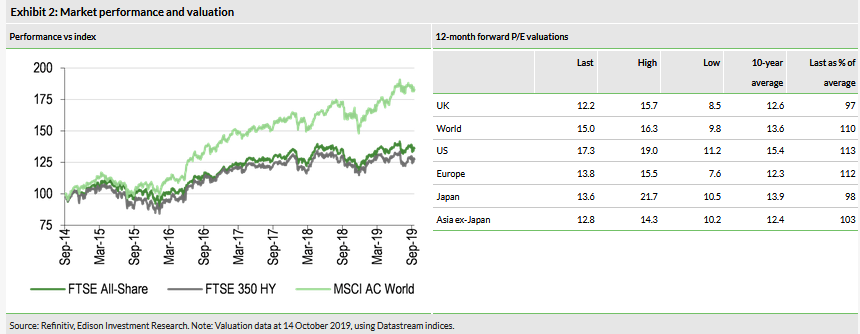
A potential positive from all this uncertainty is that UK equity valuations currently look attractive on a forward P/E basis (Exhibit 2, RHS). While global and particularly US equities are trading well above their 10-year average forward P/E ratio, UK equities are trading at a 3% discount to their average, and an 18.7% discount to the world market. This suggests opportunities may exist for UK investors who are willing to look beyond the headlines and find companies that can weather the storms. In the meantime, the UK’s 4.2% dividend yield (above the 10-year average of 3.4%, and well above the 2.6% yield on global equities) means investors are ‘paid to wait’ for a recovery in sentiment.
Fund profile: UK equity income fund focused on quality
Murray Income Trust (MUT) was founded in Scotland in 1923 and has been under the umbrella of Aberdeen Asset Management (now Aberdeen Standard Investments or ASI) since 2000. Current lead portfolio manager Charles Luke has been in place since 2006, assisted by Iain Pyle since 2018. MUT seeks to reward its investors with a high and growing income, as well as capital growth, from a relatively concentrated portfolio mainly made up of UK equities, although up to 20% may be invested overseas. Following the Aberdeen/Standard Life merger in 2017, Luke is now part of ASI’s expanded UK equity team (most of whose members were previously in the Standard Life (LON:SLA) Investments (SLI) team), which provides him with full research coverage of the FTSE 350 Index as well as access to Harry Nimmo’s UK smaller companies team. As a result, MUT now invests more in mid-cap UK stocks than hitherto. Luke’s focus is on well-managed, quality companies with solid income characteristics, which can be held for the long term.
MUT has a 46-year record of annual dividend growth, and is a member of the Association of Investment Companies’ UK Equity Income sector. It measures its performance against the FTSE All-Share Index. Gearing of up to £60m (c 10.5% of net assets) is available through a combination of long-term, fixed rate borrowing and a flexible multicurrency bank loan. Net gearing at 31 August 2019 was 2.6%. The manager may write options in order to enhance portfolio income.
The fund manager: Charles Luke
The manager’s view: Strong balance sheets are key to success
While the UK stock market remains very out of favour with investors globally, Luke says that for those with a long-term approach, there are many attractive investment opportunities in the current uncertain environment. He explains that his focus on investing in good-quality companies enables him to look past issues such as Brexit, a potential change in the UK government, trade wars and the deteriorating global economy: ‘My view is that if you focus on robust businesses with strong competitive positions, over time you will be fine. However, it is always worth being wary about what might happen in the future, as very few people can accurately call the next downturn, recession or market setback.’ Luke singles out balance sheet strength as a key aspect of his investment approach. ‘Lots of people say they invest in quality, but their portfolio characteristics do not always show it,’ he says, pointing to MUT’s average net debt to equity ratio, which is well below that of the FTSE All-Share (Exhibit 3). ‘Balance sheet strength is really important: never underestimate the ability of debt to undermine equity,’ he warns.
One of the more significant developments for MUT’s portfolio in recent years has been its increased focus further down the market capitalisation spectrum, as a result of the increased research resources available following the AAM/SLI merger. Luke says the small- and mid-cap exposure is now almost one-third of the portfolio, up from c 10% five years ago. ‘Our small- and mid-cap – but mostly mid-cap – exposure is probably higher than at any time in the last 10 years,’ he explains. ‘It has been a deliberate policy change to invest more in these areas, as that is where you tend to find under-researched, under-appreciated, quality companies that have growth potential and are in charge of their own destiny.’ He adds that there is also a greater likelihood of merger and acquisition (M&A) activity among mid-cap companies, with many takeovers happening at significant premiums to the pre-bid share price.
MUT’s dividend yield has recently dipped below that of the FTSE All-Share Index, partly because of the strongly rising share price (the revenue return per share was actually 3.9% higher in FY19 than in FY18). Luke says that one of the issues with having an objective that targets high income, income growth and capital growth in that order, is that it can be difficult to find good-quality companies with high and growing yields. ‘There is a tension between yield and capital growth,’ he explains. ‘Historically we may have focused too much on income and not enough on capital or income growth. A 4% yield is very attractive, but we want companies that can grow their dividends more rapidly than the market.’ Luke adds that by focusing on companies with stronger balance sheets, the trust has a greater likelihood of delivering on its income aspirations, maintaining its 46year record of annual dividend growth, and also getting a boost from special dividends. ‘MUT has an attractive yield and above-average dividend growth, pays dividends quarterly, has strong revenue reserves, and the option income is useful in providing an additional uncorrelated income stream,’ he concludes.
Asset allocation
Investment process: Building a focused but diverse portfolio
MUT manager Luke and deputy manager Pyle sit within ASI’s 16-strong UK equity team, and are two of the five members of the UK income product group. All the UK equity team members have specific industry research responsibilities, between them covering the full large- and mid-cap UK stock universe. MUT can also draw on overseas stock ideas from ASI’s large global investor network, and UK smaller company ideas from Harry Nimmo’s specialist Edinburgh-based team.

Quality is at the heart of MUT’s investment process (described in more detail in our initiation note), with the managers using fundamental research and frequent company meetings to identify well-managed businesses with strong balance sheets (high margins and returns on equity; low levels of net debt) and above-average earnings and dividend growth potential as well as dividend security (Exhibit 3). They seek to invest when the shares are undervalued, and hold them for the long term to allow the value to be realised. However, action will be taken swiftly if the team identifies a fundamental deterioration in any of the quality factors underpinning the investment case. ASI also takes an active approach to engaging with investee companies on environmental, social and governance (ESG) matters; Luke says this is founded in patience and persistence, and a willingness to behave as part-owners of a business, rather than simply as investors in it. The manager can draw on the expertise of ASI’s team of more than 30 in-house ESG specialists to help assess whether investee companies are acting in the best interests of their shareholders and society at large.
MUT aims to achieve a high and growing income, combined with capital growth, broadly in that order of priority. The managers construct a relatively concentrated portfolio of c 30–70 companies (currently 58), with a bias towards the larger end of the UK stock market by capitalisation, although up to 20% of assets (at the time of investment) may be in overseas holdings, and c 30% is invested in mid-cap and smaller companies. This combined diversification by both size and geography helps the managers to spread risk as well as accessing opportunities that may not be within the remit of other UK equity income funds. They also seek to diversify the portfolio by income, capital and sector (the top three sectors, using the ICB definition, may not exceed 50% of the portfolio, while the top five holdings are limited to 40%).
Portfolio turnover is low, in line with the manager’s broadly buy-and-hold approach. For FY19 turnover was c 20% (implying a five-year holding period), a slight decline from c 24% in FY18. The FY18 figure reflected a degree of rebalancing as a result of the enhancements to the investment process under the expanded UK equity team, which meets each morning to discuss company newsflow and any changes to the outlook for all stocks under their coverage.
Derivatives are used in concert with the investment process, to generate premium income on stocks the manager would be happy to top-slice (via call options), or top up at a lower share price (via put options). Gearing is deployed across the whole portfolio, with the multicurrency borrowing facility used to defray some of the foreign exchange risk of the overseas holdings.
Current portfolio positioning
At 30 September 2019, there were 58 stocks in MUT’s portfolio (51 UK and seven overseas), compared with 55 a year earlier. The top 10 holdings (see Exhibit 1) made up 31.2% of the total, which was a marginal decrease in concentration from 33.1% at 30 September 2018.

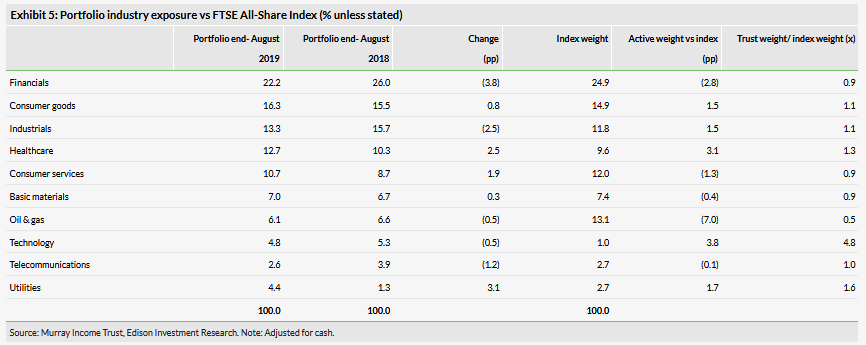
The number of overseas holdings has fallen from eight at 31 December 2018 to seven at 30 September 2019 (Exhibit 4), following the sale in July of the position in Nordea Bank. With the exception of Microsoft (NASDAQ:MSFT), all the overseas holdings are listed in Switzerland or Scandinavian/Nordic countries. MUT’s portfolio is well diversified from a sector perspective (Exhibit 5), with the only significant underweight versus the FTSE All-Share Index being in oil & gas (-7.0pp), where high yields combined with low levels of dividend cover mean many of the companies do not have the dividend security Luke seeks. The biggest overweight positions are in technology (+3.8pp, partly as a result of the 2.8% holding in Microsoft, which is off-benchmark as an overseas holding), and healthcare (+3.1pp), where again some of the larger positions are in overseas stocks.
Luke comments that the portfolio has ‘been on a bit of a journey’ over the past year or so, with a slight shift away from overseas companies (from 13.8% at 30 June 2018 to 11.2% at 30 September 2019) and UK companies with predominantly overseas earnings, in favour of more domestically focused UK companies. Recent purchases in this category include paving firm Marshalls, housing developer Countryside Properties, kitchen cabinet specialist Howdens, and retailer WHSmith, which Luke says ‘is a much better-quality company than people think’. He has also added positions in mass-affluent financial advice firm St James’s Place, and utility company SSE (LON:SSE). Medical device specialist Smith and Nephew is another recent addition, albeit one with a more international focus. Sales included Aberforth Smaller Companies Trust, given MUT’s enhanced capability to invest directly in mid-sized and smaller companies; fund manager Schroder, as the manager had concerns about the asset management industry backdrop, and also preferred St James’s Place from a quality perspective; and over-50s travel and insurance firm Saga, whose shares had fallen heavily after a surprise profit warning, and continued to slide after Luke exited the position.
The manager has been active in writing options to boost portfolio income, which is also mildly enhanced by the use of gearing. Option-writing as a strategy tends to be most successful during periods of market volatility.
Performance: Strong over both short and longer term

MUT has enjoyed a strong period of performance over the past year, outstripping the FTSE All-Share Index return (in share price and NAV total return terms) both during the sell-off in Q418 and in the subsequent recovery. Luke’s focus on quality companies (measured both quantitatively and qualitatively) has helped MUT’s performance in both absolute and relative terms, as these companies have held up better during the periodic bouts of risk-aversion that have increasingly characterised stock markets recently. The enhanced ability to react swiftly to negative developments at portfolio companies has also been beneficial for MUT. Outperformance during FY19 (ended 30 June) came mainly from stock selection, with notable contributions coming from UK stocks Aveva (software & computer services) and Diageo (LON:DGE) (beverages), and overseas holdings Microsoft (NASDAQ:MSFT) (US, software & computer services) and Roche (Switzerland, healthcare). Negative impacts came from some smaller/mid-cap holdings such as Saga (since sold) and XP Power, as well as large telecom stock Vodafone (LON:VOD). MUT’s share price performance has been stronger than its NAV returns over most periods shown in Exhibits 7 and 8, particularly so over the past 12 months as the discount has narrowed sharply.
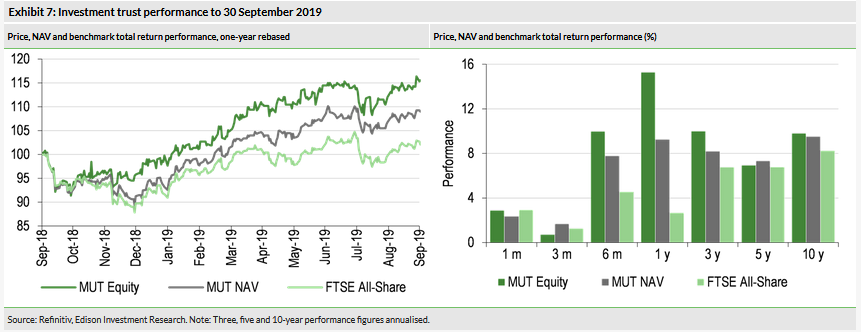
MUT’s longer-term track record is also positive in both absolute and relative terms (Exhibit 7), with share price and NAV total returns ahead of the FTSE All-Share over three, five and 10 years, and 10-year annualised returns of c 10% versus c 8% for the index. Over most periods shown in Exhibit 8, the trust has also materially outperformed the FTSE 350 Higher Yield Index (which could be seen as a reasonable proxy for the investment universe of a UK equity income fund), although it has generally underperformed the MSCI AC World Index over longer periods, due in part to the weakness of sterling (which has boosted returns from overseas investments) as well as the strong performance of the dominant US market. However, MUT’s ability to own some overseas stocks means it can capture some of this opportunity, and the underperformance has been relatively mild over most periods, with outperformance of the global index over one month and one year.

Discount: Strong performance sparks sharp narrowing

At 16 October 2019, MUT’s shares traded at a 4.0% discount to cum-income NAV. This stands up well against both short- and longer-term averages (6.2%, 7.7%, 7.0% and 4.1%, respectively, over one, three, five and 10 years), following a notable re-rating since the fourth quarter of 2018 (Exhibit 9). While MUT’s NAV total returns have been well ahead of the FTSE All-Share Index over the past year, the share price has advanced by even more, narrowing the discount to close to its lowest level in the past four years.
Capital structure and fees
Structured as a conventional investment trust with one class of share, MUT had 66.1m shares in issue at 16 October 2019, with a further 2.5m in treasury. While the board may repurchase up to 14.99% of the shares each year to manage a discount (or allot up to 5% to manage a premium), only 127,500 shares (0.2% of the share base) have been bought back in the last 12 months, with no repurchases since the end of October 2018, as the shares have enjoyed a re-rating on the back of strong NAV performance. Gearing of up to £60m (c 10.5% of net assets) is available via £40m of 10-year loan notes (issued in November 2017 with a coupon of 2.51%) and a £20m multicurrency bank borrowing facility with Scotiabank. Net gearing stood at 2.6% at end-August.
The trust pays Aberdeen Standard Fund Managers an annual management fee on a sliding scale based on net assets: 0.55% up to £350m, 0.45% from £350m to £450m, and 0.25% above £450m. Fees are charged 70% to capital and 30% to revenue. There is no performance fee. Ongoing charges for FY19 were 0.65%, a slight fall from 0.69% in FY18 and below the 0.89% average for the AIC UK Equity Income peer group.
Dividend policy and record
MUT seeks to reward its investors with a high and growing dividend, paid four times a year. Previously it has paid three interims and a final dividend; however, it has proposed a move to four interim dividends, allowing quarterly payments by removing the need to delay the fourth dividend for shareholder approval at the AGM. If the proposal is approved, from FY20 dividends will be paid in December, March, June and September (currently January, March, June and November).
For FY19, total dividends of 34.00p have been declared, a 2.3% increase on the 33.25p paid in FY18. This is the 46th consecutive year in which dividends have been increased, growing at a compound annual rate of 1.7% over five years. The FY19 dividend is 1.03x covered by revenue income, and the trust has also made a small addition to its revenue reserve, which now stands at 37.8p per share, or 1.11x the latest annual dividend.
Although it aims to provide an above-average dividend yield, MUT’s strong recent share price performance has meant the current yield, at 4.0%, is a little below the 4.2% yield on the benchmark FTSE All-Share Index. The portfolio yield has dipped below 4%, but MUT’s holdings have a higher three-year forecast dividend growth than the index, at 5.2% versus 3.6% (at end-March 2019; see Exhibit 3). The manager uses option-writing as a means of generating additional income, in concert with the investment process.
Peer group comparison
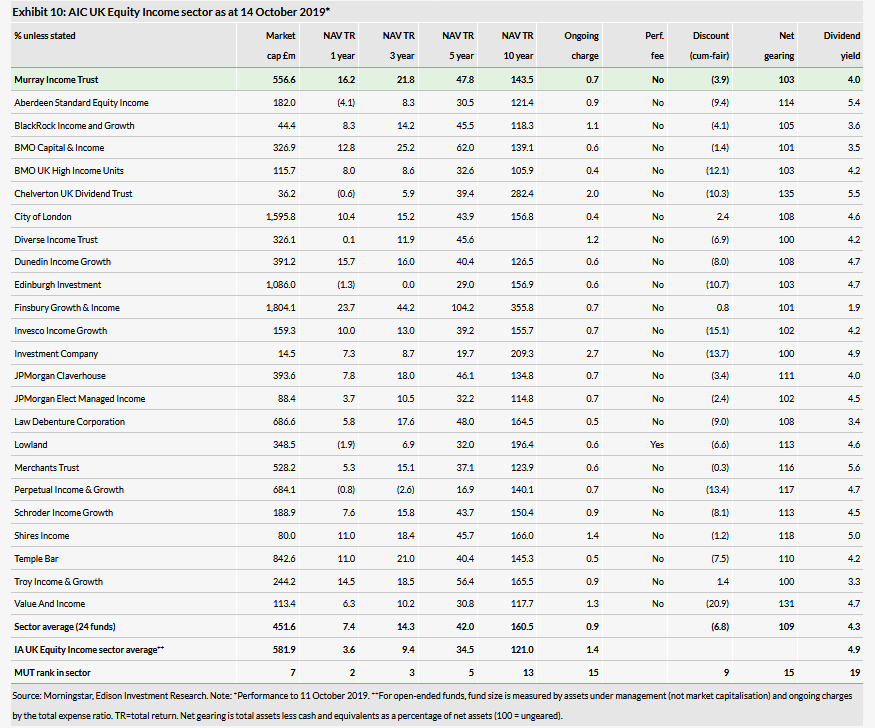
The Association of Investment Companies’ UK Equity Income sector, of which MUT is a member, is one of the largest AIC peer groups, with 24 funds having at least a one-year performance track record. In Exhibit 10 we show MUT in the context of this peer group. Strong performance over the last 12 months in particular has propelled the trust up the performance rankings, with above-average NAV total returns over one, three and five years, ranking second, third and fifth respectively, while lagging somewhat over 10 years. We also show the average returns for the open-ended Investment Association UK Equity Income sector; MUT’s performance is ahead of this peer group over all periods shown. Ongoing charges are lower than average, and, in common with all but one of the peers, MUT does not charge a performance fee. Following a recent narrowing in the discount, it is now tighter than the sector average, although three of the peers currently trade on a small premium to NAV. MUT’s gearing is below average in a sector where the majority of funds have some level of gearing, while its dividend yield is somewhat below average, largely as a result of strong share price performance. The open-ended funds have a higher yield on average, at 4.9% versus 4.3% for the closed-end funds.
The board
MUT has six independent, non-executive directors. The chairman, Neil Rogan, was appointed to the board in 2013 and took on his current role in 2017. Jean Park has been on the board since 2012, and became the senior independent director in 2018. Donald Cameron MSP also joined the board in 2012. A process of board refreshment has seen the trust appoint three new directors in the past two years: Peter Tait in November 2017, Stephanie Eastment (chairman of the audit committee) in August 2018, and Merryn Somerset Webb in August 2019. The directors have professional backgrounds in investment management, insurance, accountancy, law and personal finance journalism.